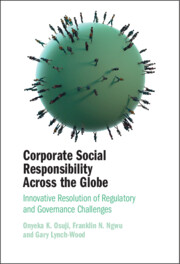 Corporate Social Responsibility Across the Globe
Corporate Social Responsibility Across the Globe Book contents
- Corporate Social Responsibility Across the Globe
- Corporate Social Responsibility Across the Globe
- Copyright page
- Epigraph
- Contents
- Figures
- Table of Cases
- Table of Legislation
- 1 Introduction: The Centrality of Regulation in Corporate Responsibility
- Part I Regulation Concepts, Paradigms and Approaches for Corporate Social Responsibility
- Part II Infusing Corporate Social Responsibility in Corporate Governance
- Part III Stimulating Private Regulation of Corporate Social Responsibility
- 8 Shareholders, Institutional Investors and Socially Responsible Investment
- 9 Professional Advisory Services and CSR Responsibilisation, Accountability and Transparency
- 10 Inventive Interventionist Regulation of Transnational Business, Sport, Cultural and Entertainment Organisations
- References
10 - Inventive Interventionist Regulation of Transnational Business, Sport, Cultural and Entertainment Organisations
from Part III - Stimulating Private Regulation of Corporate Social Responsibility
Published online by Cambridge University Press: 15 June 2023
- Corporate Social Responsibility Across the Globe
- Corporate Social Responsibility Across the Globe
- Copyright page
- Epigraph
- Contents
- Figures
- Table of Cases
- Table of Legislation
- 1 Introduction: The Centrality of Regulation in Corporate Responsibility
- Part I Regulation Concepts, Paradigms and Approaches for Corporate Social Responsibility
- Part II Infusing Corporate Social Responsibility in Corporate Governance
- Part III Stimulating Private Regulation of Corporate Social Responsibility
- 8 Shareholders, Institutional Investors and Socially Responsible Investment
- 9 Professional Advisory Services and CSR Responsibilisation, Accountability and Transparency
- 10 Inventive Interventionist Regulation of Transnational Business, Sport, Cultural and Entertainment Organisations
- References
Summary
This chapter investigates the potential and limitations of corporate social responsibility (CSR) as an inventive interventionist tool for indirect regulation of transnational non-governmental organisations (NGOs). It proceeds on the basis that transnational CSR discourse has moved on from exclusively focusing on multinational enterprises to include other business, sport, cultural and entertainment organisations. The chapter shows that CSR can be used to plug regulatory and governance gaps in international law and overcome obstructive solidarity and relational signals which will, in turn, facilitate national regulation of transnational NGOs.
Keywords
- Type
- Chapter
- Information
- Corporate Social Responsibility Across the GlobeInnovative Resolution of Regulatory and Governance Challenges, pp. 228 - 257Publisher: Cambridge University PressPrint publication year: 2023
